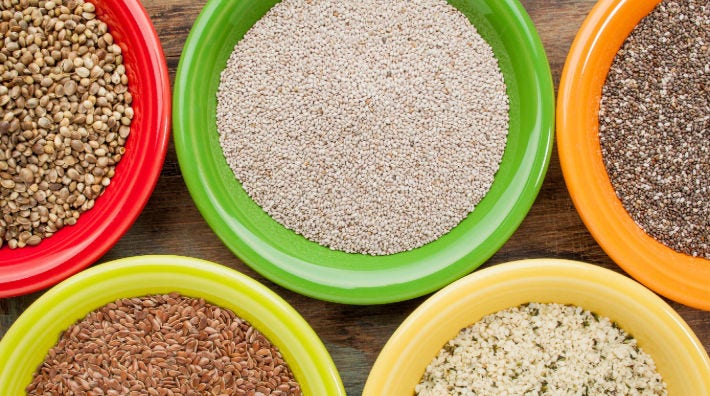Eat Healthy
Good health starts with good nutrition. Find tips and recipes to help you make healthier food choices.

Why is healthy eating important?
Eating healthy has many benefits. What and how much you eat can affect your risk of getting cancer, as well as heart disease, diabetes, and other chronic diseases. Following a healthy diet can decrease this risk and promote health and well-being.
A healthy diet includes lots of fruits and vegetables, whole grains, lean protein sources, and low-fat dairy products. The American Cancer Society recommends eating a variety of these foods every day.
These foods contain important vitamins, minerals, and antioxidants and they’re usually low in calories. In general, vegetables and fruits with the most color – dark green, red, yellow, and orange – have the most nutrients.
Steps for eating healthy
Eating healthy doesn’t mean you can only eat certain foods. Instead, focus on balance and variety. Choose food from all the main food groups that have more of the healthy things you need, and less of the unhealthy things you are trying to avoid.
Reading food labels and understanding food terms can help you figure out what to eat. Pay attention to portion sizes. Try to limit foods high in saturated fats, added sugar, and salt.
Start with small changes and add more over time. You don’t have to give up all your favorite foods. Instead, look for ways to make them fit into your healthy eating plan.
It can be helpful to plan ahead and prepare meals at home. If you are eating out or on the go, try to find ways to select more healthy options or adjust your eating plan for the day.
Quick tips for eating healthier by meal
Starting to eat healthy doesn’t mean you have to change what you eat all at once. Try adding fruits and vegetables throughout the day.
If you are having cereal, choose low- or non-fat milk and slice a medium or half a large banana on top.
Pour half a cup of berries into a cup of plain low-fat yogurt.
Add spinach and tomato to your morning omelet.
Keep sliced red, orange, and yellow peppers in the fridge to eat with hard-boiled eggs or low-fat cottage cheese.
For a quick lunch, try a wrap or pita sandwich made with grilled chicken or other lean meat or low-fat cheese. Load the wrap with vegetables. For a side, have a cup of hearty vegetable soup or a small side salad with low-fat dressing.
Choose lean protein that is baked, roasted or sauteed in olive oil instead of fried. Or try a plant-based entree with beans, lentils, or tofu.
For an easy veggie side, cook fresh, frozen or canned veggies (without added salt or sauces) in the microwave. Or microwave a sweet potato and add a teaspoon of a healthy oil r and a light sprinkling of cinnamon and brown sugar.
Snacks are a great way to add more fruits or vegetables to your diet. Eat an apple, a handful of baby carrots, or a small orange. For protein, have a small handful of mixed nuts or a cup of low-fat yogurt or milk.
If you’d like something more crunchy, try celery, a handful of grapes, or whole grain crackers with peanut or almond butter for a balance of carbs and protein.
Savor a frozen treat made from 100% juice. Another option is adding 1/2 cup of melon slices, peaches, or other fruit to a toasted whole-grain waffle.
Meal ideas to fit your lifestyle
More resources
- Written by
- References

The American Cancer Society medical and editorial content team
Our team is made up of doctors and oncology certified nurses with deep knowledge of cancer care as well as editors and translators with extensive experience in medical writing.
US Department of Agriculture, Dietary Guidelines for Americans 2020-2025: Make Every Bite Count With the Dietary Guidelines (9th ed.) Accessed at https://www.dietaryguidelines.gov/ on July 31, 2025.
US Department of Agriculture, Eat healthy with MyPlate. Accessed at https://www.myplate.gov/ on July 29, 2025.
Last Revised: September 3, 2025
American Cancer Society medical information is copyrighted material. For reprint requests, please see our Content Usage Policy.
American Cancer Society Emails
Sign up to stay up-to-date with news, valuable information, and ways to get involved with the American Cancer Society.










